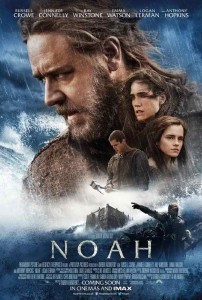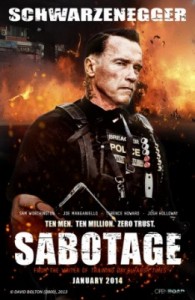 “Noah” is a serious, thoughtful, reverent movie that, like its title character, wrestles with the big issues of morality, survivor guilt, and strengthening a connection to the divine. It is also a big, grand adventure with drama and special effects. It should satisfy believers, seekers, and those who just want an exciting story, well told.
“Noah” is a serious, thoughtful, reverent movie that, like its title character, wrestles with the big issues of morality, survivor guilt, and strengthening a connection to the divine. It is also a big, grand adventure with drama and special effects. It should satisfy believers, seekers, and those who just want an exciting story, well told.
Writer/director Darren Aronofsky (“Black Swan”) shows us a Noah (Russell Crowe) who struggles to be a good man and do as God wants. Only ten generations from Adam and Eve, he is haunted by the stories of the Fall and Cain’s murder of his brother. When he was a boy, he witnessed the murder of his own father at the hand of the brutal leader of the descendants of Cain (Ray Winstone as Tubal-Cain). Now, he tries to protect his wife, Naameh (Jennifer Connelly), and three sons from the marauders.
Noah lives lightly on the earth, gently chiding his son for picking a flower because that interfere with its work of spreading seeds. He and his family do not eat animals; they respect the innocence of all creatures, unlike Tubal-Cain who defines himself as someone who takes without regard for anything but his own urges and lust for power.
Noah is filled with an ominous sense that he is receiving omens and seeks the advice of his mystic of a grandfather, Methuselah (Sir Anthony Hopkins). He begins to understand that he is commanded by The Creator to build an ark and collect the animals of the earth and to preserve them in the coming storm that will wipe out all of life on Earth. He will be helped in this by The Watchers, fallen angels who were once pure light but are now punished for their mistakes by being imprisoned in enormous bodies of mud and rock.
As Auden reminds us, the grand, sweeping events of the world do not happen purely. They occur in the midst of human lives that are messy and imperfect. While Noah struggles to follow the will of The Creator, he has to deal with problems at home. Ila (Emma Watson), a girl Noah and his family rescued after her entire community was slaughtered by Tubal-Cain, is loved by Noah’s son, Shem (“Romeo & Juliet’s” Douglas Booth), who loves her, too. But due to her injuries, she cannot have children, and she does not want to keep him from being a father and creating a new generation. Ham (Logan Lerman of “Percy Jackson”) is furious that there is no prospect of a wife and family for him.
And then there is Tubal-Cain, used to taking whatever he wants. He will do anything to stay alive through the flood and become king of whatever the world will be afterward. And he senses that Ham may be susceptible to joining him.
We rarely see Bible stories told with such artistry and power. The acting is superb and the special effects are well done. The big moments, the flood, the omens, the Watchers, the thousands of animals moving inexorably toward the ark, are all handled with meaning and import. When Noah tells his family one of the few stories that they have in this still-new human world, the story of creation, we feel the nothingness that was before. Story-telling itself becomes a way to shape the world and form an understanding of patterns, purpose, and meaning.
Men wind a snakeskin around their arms in the earliest of rituals and prayers and we see the flicker of what would become a daily observance for Orthodox Jews over the millennia through the present, the phylactery leather strips that men use in their morning prayers. We are reminded that this is a time before Jesus and before Abraham, when there was no organized religion and no established set of beliefs and practices. There is not even the word “God.” It is just “Creator.”
The innocence and the impulse to reach out toward the heavens are very moving. So is the way that Noah grapples with what today we might call survivor guilt or PTSD. And he struggles to find his better angels. Tubal-Cain is not just a man who wants to fight him; he is that part of Noah himself that is all lower urges toward flesh and power, the impulse to trap and smash and to break laws even in a world where laws have not been established.
While some viewers and some who have not even seen the film have objected to this portrayal (or, in the case of strictly Muslim groups, any portrayal of a religious figure), most should see this film as an eternal story well told in a manner that is itself a form of worship in prompting us to think more profoundly about our own choices and connections.
Parents should know that this film includes epic/Biblical violence including murder, battles, flood, some disturbing images, parent killed in front of child, character trampled to death, discussion of infanticide, some disturbing images, non-explicit sexual situation, and childbirth.
Family discussion: Why did the two groups of humans develop so differently? What should Noah have done about Na’el? Why did he separate from the family after the flood?
If you like this, try: “The Fountain” and “Pi” by the same director and Biblical-era classics like “Ben-Hur” and “The Ten Commandments”


